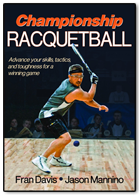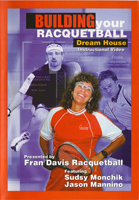
frandavisracquetball.com
Winning doubles requires more than banging the ball, standing anywhere, and playing like singles together on the court. It’s primarily a game of strategy and positioning at the intermediate and advanced levels. Two people join skills and unify into a singular unit, moving and working independently and together at the same time. Doubles is truly an art; it is like playing the game of chess at 100+ mph.
One of the biggest myths of doubles is that if you are a good singles player you’ll be a good doubles player, but that couldn’t be further from the truth. Teamwork is the key to success. Figuring out all the elements, the seven secret components, is critical as it can make or break a doubles team so do this FIRST when picking a partner:
1. Chemistry plays a big part when playing doubles. Chemistry is defined as a mutual attraction or rapport. Basically, players should be able to get along. The better the friendship, the better the partnership. Doubles is a game of saves and covering one another.
2. Communication is the key in any relationship, and doubles is just another relationship. You must be able to talk to each other and share your thoughts and know what the other thinks out there before, during, and after the match. There needs to be a quarterback, or leader, on the court calling the plays. The last thing you want is for both players to go for the same shot.
3. Contrasting Game Styles are a necessity when you are playing doubles. The best teams generally have partners with contrasting game styles; the differences tend to complement one another and balance things out.
4. Contrasting Peresonality Types tend to complement one another and balance things out. If two players have the same personality traits, one cannot complement the other, and they cannot feed off each other in a troubled situation.
5. Specialty Positions just like any other sport is relevant in racquetball as well. In football there is a running back, wide receiver, etc.; in baseball there is a catcher, pitcher, etc.; in basketball there is a forward, guard, etc. Athletes playing in these positions are skilled in their specialty. In racquetball it is no different. Knowing how to play a particular position takes a special skill and will usually enhance the team’s performance.
6. Controlling your attitude, the tempo and rhythm, your positioning, service strategy, game strategy, and shot selection creates the best unity between doubles partners.
7. Shots for Doubles are the pass shots (DTL, wide angle, jam and overhead), reverse pinch, and z-shot because of the number of players on the court and the teams’ court positions create a smaller margin of error.
I use “The Art of Doubles” with my “Championship Team,” Rocky, Paola, Jason, Taylor, Sharon, Connor, Jordan, and Wayne, as at one point or another they all play or have played doubles. I encourage each and every one of them to use the “seven secret components”, to pick a partner. Here are some of the BEST doubles teams every to play together and have won numerous Amateur and Pro National and World Championship Titles:
Jason Mannino/Sudsy Munchik, Jason Mannino/Cliff Swain, Jason Mannino/Kane Waselenchik
Rocky Carson/Jack Huzcek, Rocky Carson/Jose Rojas
Paola Longoria/Samantha Salas
Connor Laffey/Wayne Antone
Jordan Cooperrider/Ericka Manilla
Let’s examine what tools Rocky, Paola, Jason and all of my athletes use for developing “The Art of Doubles” by taking a closer look at all 3 sides of The Sports Racquetball Triangle: Conditioning, Mental, and Physical Skills
Left Side of the Triangle
If you are going to play doubles at the highest level within your own skill level conditioning and starting up a good basic program is key. You want to work on all the basic aspects of conditioning such as footwork, agility, speed, power, balance, flexibility, core strength and cardiorespiratory endurance, NOT just one. There are no shortcuts when it comes to getting and keeping your body in shape, so you can go the distance in a doubles match. You need to maneuver your body around the court as you are getting into position to hit the ball as it comes off the wall at different angles, heights, and speeds while having a sense of where your partner is and where your opponents are on the court. Being able to make adjustments on a dime is critical.
Use the Conditioning and Flexibility chapter in my book, “ Championship Racquetball” to understand your conditioning level. This will lead to more consistency, as you will be able to set up on more balls and therefore shoot a better shot to put pressure on the doubles team you are playing, Chapter 10 (pages 237-257).
You want to make sure you are eating right and drinking lots of water as your body and mind NEEDS this in order to perform at it’s best, especially when you are playing doubles where rallies can be notoriously longer.
***Check my book, “Championship Racquetball” for specific information on your NUTRITIONAL needs.
Right Side of the Triangle
Mental Skills
Emotion
The strongest sense we have is our feeling state. If it feels great, we continue doing it. If it does not feel good, we stop the pattern. So you have to feel great out on the court WITH YOUR PARTNER all the time. The greatest performances come from a state of enjoyment. We take risks, take chances, and are more creative in this state. If you are not enjoying racquetball and YOUR PARTNER, why are you playing?
Use the mental skills in my book, “ Championship Racquetball” to understand your “Emotions” which will help you play smarter and happier doubles, Chapter 9, (page 223 & page 225).
Base of the Triangle
Physical Skills
Drilling is especially important in doubles because you will be hitting different shots and serves more frequently. In singles, you need only be concerned about the strengths and weaknesses of two players (you and your opponent), whereas in doubles, you must be concerned about four. In singles, you have to hit the ball around only one player, whereas in doubles, you must know where three other players are on the court beside yourself. Given these facts, you must hit many different shots and serves effectively to succeed.
Proper drilling for doubles is a major factor of your success in doubles:
1-Partner Reaction
2-Z and Jam Serve Returns
3-Wide-Angle Pass with Partner
4-Reverse Pinch
5-Overhead Pass
Make sure, as we have done in the past, track your progress by choosing the shot and then do a certain amount of those shots and then keep track how many good ones out of that total # you did. As you “learn the art of doubles” and practice more and more of the specific doubles drills you will get more and more consistent with YOUR PARTNER.
Use the physical skills in my book, “ Championship Racquetball” to understand the “Doubles Drills”, Chapter 11 (page 273-274).
ALL of the players I coach, from the professionals led by Rocky and Paola to the amateurs, know just how important it is to learn “The Art of Doubles” and it starts with utilizing “the seven secret components” in picking a doubles partner. Their doubles records speak for themselves…Rocky and Paola is BOTH 2014 National Doubles Champions for their respective countries. They will BOTH be competing at the World Championships in Toronto, Canada this summer where Paola will be defending her doubles as well as singles titles.
In the next issue, I will continue to build your Championship Racquetball Game one level at a time so you too can be ready to become the champion you always dreamed of becoming, by giving you the tools to make it a reality. Rocky ‘s and all my athletes “Championship Racquetball Games” stem from their focus on ALL 3 sides of the triangle working together so they can develop into top competitors. Without a shadow of a doubt, they KNOW just how important it is to do the work. They are living proof it works and their titles substantiate it.
For details on more personalized instruction, a weekend camp, instructional DVD’s, our book, Championship Racquetball, and our APP (coming soon), ALL which covers all aspects of the Sports Racquetball Triangle and more, please visit www.FranDavisRacquetball.com.Fran Davis is a 2004 racquetball Hall of Fame inductee, Racquetball Woman of the Year 2009, Coach #2 IRT Pro Player and 1X US Open Champion, Rocky Carson; Coach #1 Women’s LPRT Pro Player and 4X and present US Open Champion, Paola Longoria; Coach Jr. World & National Champion, Intercollegiate Champion, & IRT Pro Player, Taylor Knoth; Coach Intercollegiate Champion & LPRT Pro Player, Sharon Jackson; Master Professional Instructor/Coach USAR-IP. International Racquetball Tour.










